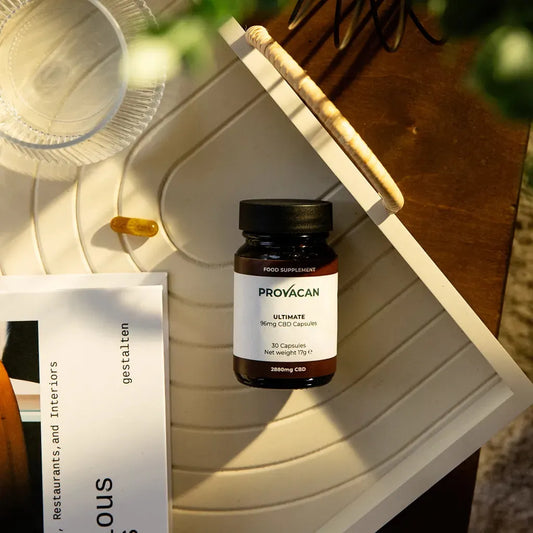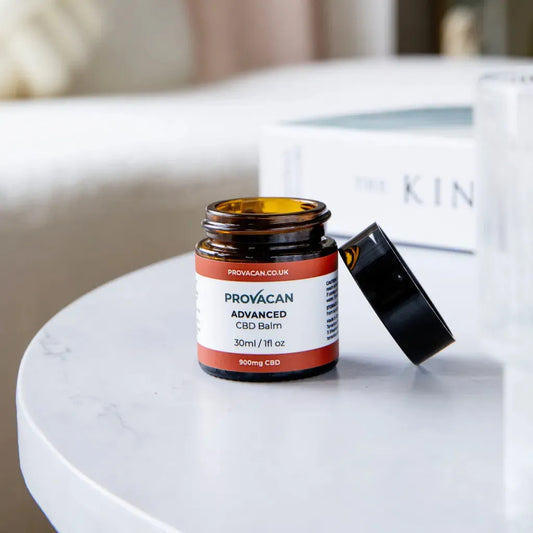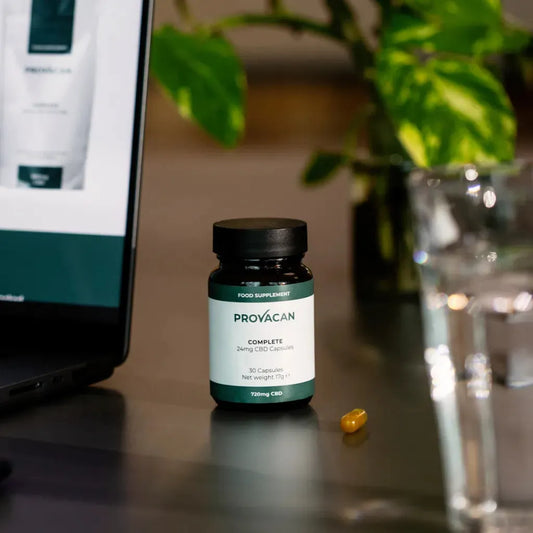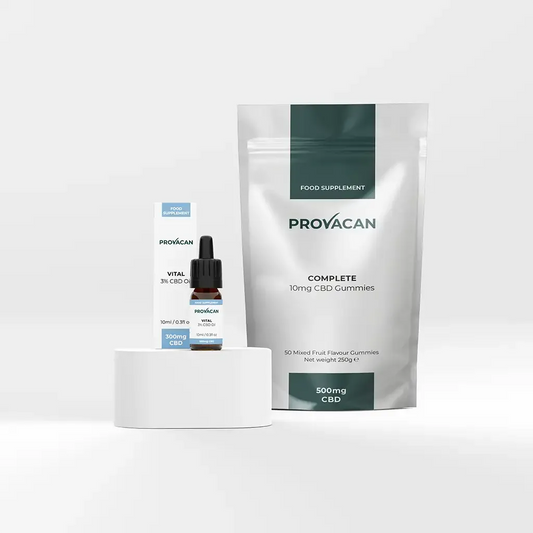Key Takeaways:
- THCA vs CBD: THCA is a non-psychoactive cannabinoid found in raw cannabis, whereas CBD is a stable, non-psychoactive cannabinoid with broad wellness applications.
- Legal Status: CBD is widely legal and available in the UK, while THCA faces stricter regulations due to its potential to convert into psychoactive THC.
- Wellness Applications: THCA is valued for its raw, non-psychoactive properties, while CBD is popular for its versatility and wide range of product availability.
Provacan is a leading authority in the UK’s wellness industry, renowned for offering high-quality CBD products backed by scientific research and innovation. With a strong commitment to educating consumers, Provacan aims to provide clear, evidence-based information on the benefits and differences between various cannabinoids.
THCA (Tetrahydrocannabinolic Acid) and CBD (Cannabidiol) are two of the most discussed compounds in the wellness space. Each offers unique properties and benefits, and understanding their differences is crucial for optimising their wellness routine.
This piece will explore the key differences between THCA and CBD, helping you decide which is more suitable for your needs.
Understanding THCA
THCA, or tetrahydrocannabinolic acid, is a naturally occurring cannabinoid found in the raw cannabis plant. It exists in abundance before the plant undergoes any form of heating, such as smoking, vaping, or cooking. Unlike THC, it's more commonly known derivative, THCA is non-psychoactive, meaning it does not produce the mind-altering effects typically associated with cannabis use. This makes THCA an appealing option for those seeking the benefits of cannabis without the "high."
In its natural state, THCA is particularly valued for its potential applications within the wellness industry. Many consumers are interested in incorporating THCA into their daily routines due to its unique properties, distinct from other cannabinoids like CBD or THC. As awareness grows, so does interest in raw cannabis products that preserve THCA in its original form. This focus on non-psychoactive cannabinoids is part of a broader trend towards more natural and holistic approaches to health and wellness.
Understanding CBD
CBD, or Cannabidiol, is one of the most prominent cannabinoids found in cannabis and hemp plants. Unlike THC, CBD is non-psychoactive, meaning it does not induce the "high" commonly associated with cannabis use. This has made CBD a popular choice for individuals looking to explore the benefits of cannabinoids without the mind-altering effects. CBD interacts with the body’s endocannabinoid system, which plays a role in regulating various physiological processes.
In the UK, CBD has gained significant attention within the wellness industry, with products ranging from oils and capsules to balms and gummies. Its versatility and non-intoxicating nature have made it an appealing option for those seeking a natural approach to enhancing their wellbeing. As awareness of CBD continues to grow, more consumers are integrating it into their daily routines, whether for relaxation, focus, or general health support.
Key Differences Between THCA And CBD
Chemical Structure And Conversion
THCA is the acidic precursor to THC, found in raw cannabis plants, and remains in this form until it undergoes decarboxylation through heat exposure, converting it into THC. This transformation is what gives THC its psychoactive properties, distinguishing it from THCA, which does not produce a high. Conversely, CBD is a stable cannabinoid that does not undergo such conversion when heated. It maintains its non-psychoactive nature regardless of the method of consumption, making it versatile for various wellness applications.
Interaction With The Endocannabinoid System
THCA has limited interaction with the endocannabinoid system, particularly with CB1 receptors in the brain, so it does not produce psychoactive effects. Instead, it interacts with the body differently, potentially offering various non-psychoactive benefits. CBD, however, interacts more broadly with CB1 and CB2 receptors, which regulate a wide range of physiological functions. This broader interaction allows CBD to have a more pronounced impact on overall wellness without the intoxicating effects associated with THC.
Availability In Products
THCA is primarily preserved in raw cannabis products, such as juiced cannabis leaves or specially formulated raw cannabis oils, which retain the cannabinoid in its original form. These products are often marketed towards those seeking the raw, unaltered benefits of cannabis without psychoactive effects. Conversely, CBD is widely available in various forms, including oils, capsules, gummies, and topicals, making it accessible to a broader audience. Its stable nature and non-psychoactive properties have contributed to its popularity in the wellness industry.
Potential Benefits Of THCA
Non-Psychoactive Wellness Support
THCA is increasingly recognised for its non-psychoactive properties, making it an ideal option for individuals seeking the natural benefits of cannabis without experiencing the high associated with THC. As it remains non-psychoactive even in its raw form, THCA allows consumers to explore the potential wellness applications of cannabis in a manner that aligns with their lifestyle and comfort levels. This makes it particularly appealing to those who are new to cannabis.
Role In Holistic Approaches
THCA is becoming a key component in holistic health practices, with a growing preference for natural and plant-based remedies. Its inclusion in wellness routines reflects a broader trend towards embracing the full spectrum of cannabinoids available in the cannabis plant, beyond just THC and CBD. By incorporating THCA into their daily practices, individuals can take advantage of a wider range of cannabis compounds that contribute to overall wellbeing.
Consumption Through Raw Cannabis Products
THCA is primarily consumed through raw cannabis products, such as freshly juiced cannabis leaves or specially prepared tinctures that avoid heating. These products are designed to maintain THCA in its original state, offering a unique approach to cannabis consumption that prioritises natural, unaltered cannabinoids. This method of consumption is particularly favoured by those interested in maximising the plant’s original benefits without altering its chemical structure.
Interest In Natural Cannabinoids
There is a growing interest in natural cannabinoids like THCA, driven by a desire for less processed and more organic wellness options. As consumers become more educated about the various compounds in cannabis, there is a noticeable shift towards products that preserve these compounds in their most natural form. THCA, with its raw and unprocessed nature, fits perfectly within this trend, providing an alternative for those who wish to explore the broader benefits of cannabis.
Potential Benefits Of CBD
Versatility In Wellness Applications
CBD is widely recognised for its versatility in wellness routines, offering a range of applications that cater to various needs and preferences. Its non-psychoactive nature makes it suitable for daily use, allowing individuals to incorporate it into their lifestyles without any concerns about intoxication. Whether used in oils, capsules, or topicals, CBD is embraced for its ability to support overall wellbeing in a manner that is both accessible and effective.
Support For Relaxation And Focus
CBD is often chosen for its potential to promote relaxation and enhance focus, making it a popular choice among those seeking balance in their daily lives. Its interaction with the endocannabinoid system is believed to help maintain homeostasis, contributing to calm and clarity. This has led to its widespread use in products aimed at improving mental and emotional wellbeing without the sedative effects associated with some other wellness products.
Inclusion In A Variety Of Products
The broad appeal of CBD is reflected in the wide variety of products available on the market, from tinctures and capsules to gummies and skincare items. This diversity allows consumers to select the format that best suits their needs and preferences, whether looking for a quick and convenient option or a more indulgent experience. The availability of CBD in such a range of products underscores its popularity and the trust consumers place in it as a reliable wellness ingredient.
Growing Popularity And Acceptance
CBD has seen a significant rise in popularity and acceptance, particularly in the UK, where it is legally available and widely used. This growth is driven by increasing consumer awareness of its benefits and the desire for natural, non-pharmaceutical alternatives. As more people integrate CBD into their wellness routines, it continues to establish itself as a cornerstone of modern health practices, appreciated for its safety and efficacy.
Legal Status In The UK
Legal Status Of CBD
CBD is legally available and widely accepted in the UK, provided it meets specific criteria. CBD products must be derived from industrial hemp strains that are EU-approved and contain no more than 0.2% THC. Additionally, these products should be marketed as food supplements and not make any medical claims. The legal clarity around CBD has contributed to its popularity, with a wide range of products available for consumers seeking its benefits.
Legal Status Of THCA
THCA's legal status in the UK is more complex due to its relationship with THC. Although THCA itself is non-psychoactive, it is closely regulated because it can convert into THC when heated. Products containing THCA are subject to stricter controls and are generally less accessible than CBD products. The regulatory framework around THCA is influenced by its potential to produce psychoactive effects when converted to THC, limiting its availability in the market.
Regulation Of Cannabis-Derived Products
THCA and CBD are subject to stringent regulations in the UK, particularly in their production and marketing. The UK government requires that any cannabis-derived product must adhere to specific guidelines, ensuring that THC levels remain within legal limits. This regulatory environment aims to protect consumers while allowing access to non-psychoactive cannabinoids like CBD and, to a lesser extent, THCA.
Market Implications
The legal distinctions between CBD and THCA have significant implications for the market, influencing availability and consumer access. While CBD enjoys widespread acceptance and is found in numerous products across the UK, THCA's restricted status means it is less commonly available. This difference impacts consumer choice, with CBD being the more readily accessible option for those looking to explore cannabinoid-based wellness products.
Choosing Between THCA And CBD
Considering Your Wellness Goals
When deciding between THCA and CBD, it is important to consider your specific wellness goals. If you are looking for a non-psychoactive option that can be integrated into a natural, unprocessed lifestyle, THCA might be appealing, particularly in raw cannabis products. CBD, however, offers more versatility and is widely available in various forms that cater to different wellness needs, from relaxation to focus.
Availability and Accessibility
CBD is far more accessible in the UK market, with a wide range of products that can be easily incorporated into daily routines. Its legal status and the variety of available formats make it a convenient choice for those looking to explore cannabinoid-based wellness products. THCA, on the other hand, is less commonly found due to stricter regulations and its association with THC.
Regulatory Considerations
The legal framework in the UK significantly impacts the choice between THCA and CBD. CBD is legally available and regulated, presenting fewer hurdles for consumers. THCA's complex legal status and restricted availability mean that those interested in this cannabinoid must navigate a more challenging landscape, often with fewer product options.
Personal Preferences
Ultimately, the choice between THCA and CBD will depend on individual preferences and how each cannabinoid fits into your lifestyle. If ease of access and versatility are priorities, CBD is likely the more suitable choice. For those specifically interested in the benefits of raw cannabis and who are comfortable with the more limited options available, THCA offers a unique and natural alternative.
Final Thoughts
As the wellness industry continues to evolve, the distinct roles of THCA and CBD in promoting health and wellbeing are becoming increasingly clear. These cannabinoids, while different in their effects and applications, each offer valuable contributions to a holistic approach to wellness. THCA’s presence in raw cannabis products aligns with a growing preference for natural, unaltered remedies. At the same time, CBD's versatility and accessibility have made it a cornerstone in many people's wellness routines.
Navigating the complexities of these cannabinoids is key to maximising their benefits. Whether you’re interested in the non-psychoactive, raw potential of THCA or the well-rounded support CBD provides, understanding its unique properties allows you to make choices that best align with your wellness goals. With the right knowledge and products, you can confidently integrate these potent compounds into your daily life, enhancing your overall health and wellbeing.
Read also:
- Sweet Relief: The Top Benefits Of CBD Gummies
- How Long Do CBD Gummies Take to Wear Off? What You Need to Know
- What Do CBD Gummies Do? A Complete Guide
Frequently Asked Questions About THCA Vs CBD
What is the primary difference between THCA and CBD?
THCA (Tetrahydrocannabinolic Acid) is the non-psychoactive precursor to THC, found in raw cannabis, whereas CBD (Cannabidiol) is a stable, non-psychoactive cannabinoid that interacts more broadly with the body's endocannabinoid system.
Can THCA get you high like THC?
No, THCA is non-psychoactive in its raw form and does not produce the "high" associated with THC. It only converts to psychoactive THC when heated.
Is CBD legal in the UK?
Yes, CBD is legal in the UK as long as it is derived from EU-approved industrial hemp strains with no more than 0.2% THC and is marketed as a food supplement.
What are the potential benefits of using THCA?
THCA is valued for its non-psychoactive properties and potential wellness benefits, making it an appealing option for those seeking natural, raw cannabis products without intoxication.
Why is CBD more widely available than THCA?
CBD's stable nature, clear legal status, and broad application in wellness products make it more accessible, while THCA's complex legal status and potential conversion to THC limit its availability.
How does THCA interact with the endocannabinoid system compared to CBD?
THCA has limited interaction with the endocannabinoid system, particularly the CB1 receptors, while CBD interacts more broadly with both CB1 and CB2 receptors, influencing a wide range of physiological processes.
Can THCA be used in daily wellness routines like CBD?
Yes, THCA can be incorporated into daily wellness routines, particularly through raw cannabis products like juices or tinctures that preserve their natural state.
Are there any legal restrictions on THCA in the UK?
Yes, THCA is closely regulated in the UK due to its potential to convert into psychoactive THC when heated, leading to stricter controls compared to CBD.
What forms of CBD products are available in the UK market?
CBD is available in various forms, including oils, capsules, gummies, topicals, and more, catering to various consumer preferences and wellness needs.
Should I choose THCA or CBD for my wellness needs?
The choice between THCA and CBD depends on your specific wellness goals, legal considerations, and personal preferences. CBD is more versatile and widely accessible, while THCA offers a unique, natural option in raw cannabis products.
Sources:
- Roman, M. G., Cheng, Y.-C., Kerrigan, S., & Houston, R. (2022). Evaluation of tetrahydrocannabinolic acid (THCA) synthase polymorphisms for distinguishing between marijuana and hemp. Journal of Forensic Sciences. https://doi.org/10.1111/1556-4029.15045
- Burstein, S. (2015). Cannabidiol (CBD) and its analogs: a review of their effects on inflammation. Bioorganic & Medicinal Chemistry, 23(7), 1377–1385. https://doi.org/10.1016/j.bmc.2015.01.059
- Oultram, J. M. J., Pegler, J. L., Bowser, T. A., Ney, L. J., Eamens, A. L., & Grof, C. P. L. (2021). Cannabis sativa: Interdisciplinary Strategies and Avenues for Medical and Commercial Progression Outside of CBD and THC. Biomedicines, 9(3). https://doi.org/10.3390/biomedicines9030234
- Iu Raïch, Rivas-Santisteban, R., Lillo, A., Lillo, J., Reyes-Resina, I., Nadal, X., Ferreiro-Vera, C., de, S., Majellaro, M., Sotelo, E., Navarro, G., & Franco, R. (2021). Similarities and differences upon binding of naturally occurring Δ9-tetrahydrocannabinol-derivatives to cannabinoid CB1 and CB2 receptors. Pharmacological Research, 174, 105970–105970. https://doi.org/10.1016/j.phrs.2021.105970


























